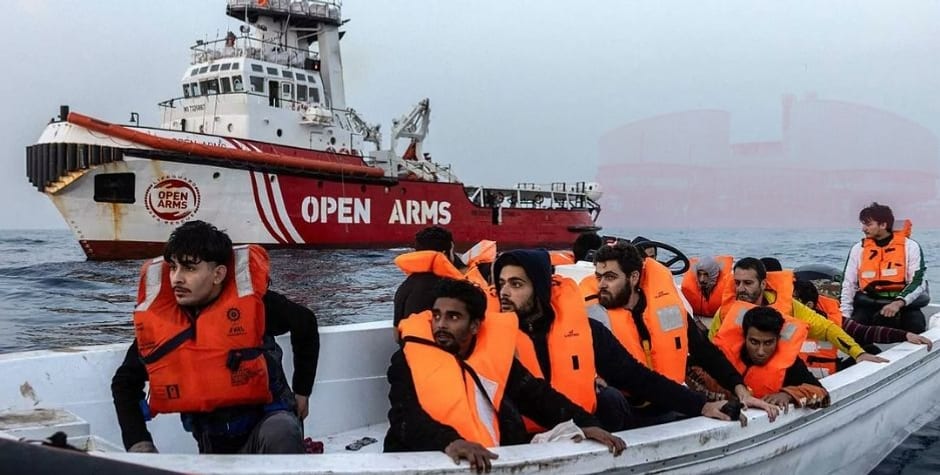

Does the ECHR have the power to suspend expulsions of migrants?
Does the ECHR have the power to suspend expulsions of migrants?
At a time when the UK and the ECHR are engaged in a “tug-of-war” over immigration control following the recent adoption of a law providing for the relocation of asylum seekers to Rwanda, Grégor Puppinck explains how the ECHR has granted itself the power to suspend deportation procedures. He has published an in-depth study on the subject.
Many politicians accuse the European Court of Human Rights (ECHR) of being an obstacle to immigration control. Indeed, it is, for its mission is to protect everyone who sets foot in Europe. The ECHR guarantees their rights, and it prohibits States from sending an immigrant back to their country of origin if the immigrant would likely face mistreatment or serious human rights violations. This is why the ECHR is regularly criticized for preventing governments from deporting foreign terrorists. In fact, not a day goes by without the Court imposing “interim measures” that oblige States to suspend an expulsion pending a ruling on the merits. In recent years, the number of interim measure requests submitted to the Court has almost doubled, rising from 1,936 in 2021 to 3,634 in 2023. Of the 3,634 requests in 2023, 1,419 were granted in the same year, according to ECHR statistics. These statistics are not made public, so it is not possible to know further details.
What politicians do not seem to know is that governments have never granted the European Court the power to suspend expulsion proceedings—they have only given the Court the power to rule on such cases. Indeed, the States deliberately withheld the power to suspend expulsion proceedings from the ECHR when the European Convention was drafted, and at each subsequent reform of the Court, the States have continued to withhold this power. For a long time, the Court acknowledged in its case law that it did not possess the authority to suspend expulsion proceedings, and it even considered it impossible to deduce such power from the text of the European Convention. This, however, did not prevent the Court from unilaterally attributing this power to itself in 2005 by declaring that State compliance with the Court’s interim measures was mandatory. This was an unprecedented ruling in which the Court condemned Turkey for extraditing two people accused of terrorism to Uzbekistan despite the Court having issued provisional measures to the contrary. Since then, the number of requests for provisional measures has exploded, and the Court’s scope has significantly expanded.
Convinced that its decision was morally right and beneficial to the Court’s mechanism for protecting human rights, the Court twisted the law to declare its interim measures binding. From the Court’s point of view, the fact that its ruling was contrary to Court precedent and the law laid down by the States that had established it was irrelevant, because the law was not so much contradicted as it was necessarily overridden in the progress of human rights. By declaring its provisional measures binding, the ECHR also sought to strengthen its own power—to raise itself to the level of other international bodies explicitly endowed with the power to suspend immigrant expulsions. Although the States designed the ECHR to operate on the same basis as all international bodies—that of loyal cooperation and good faith—the Court sought to function along the lines of national and federal courts. In so doing, the Court has replaced cooperation with subordination.
For the Court, possessing the authority to suspend expulsion proceedings is essential to effectively protecting foreign nationals facing deportation. Even if it is only applied to a few thousand people each year, this power is a “lock” that obliges States to respect all ECHR case law regarding expulsion proceedings. But it is also an “Achilles' heel,” for this authority is not written into in the European Convention on Human Rights—it can only be found in the Court's own rules of procedure (article 39). Moreover, the Court exercises its illegitimate power to suspend expulsion proceedings in an opaque manner; the Court does not disclose its reasoning and its decisions are not published (with rare exceptions), are imposed without adversarial debate, and are not subject to appeal. Until recently, the Court’s decisions were not even signed.
But this power is contested. As deplored by Síofra O'Leary, former President of the ECHR, “In 2023, some States continued to assert that they doubted whether they were bound by interim measures.” She found it “very worrying that certain contracting States are prepared to disregard their international obligations in this way” (cf. ECHR Annual Report 2023).
One of the most notable examples of a State challenging the Court’s authority to suspend expulsion procedures can be found in the UK. The UK’s challenge came in response to a 2022 ECHR measure attempting to prevent the British government from relocating illegal aliens to Rwanda while their asylum applications were processing.
Additionally, the French Interior Minister defied the Court’s authority by sending a terrorist back to Uzbekistan in 2023 in violation of contrary provisional measures prescribed by the ECHR. However, in both cases, each country’s national courts ultimately upheld the binding nature of the ECHR's interim measures by condemning their respective governments. For example, the Conseil d'État enjoined the government “to take, as soon as possible, all necessary measures to enable the return, at the State's expense,” of the Uzbek in question, even though he had been banned from the country since 2021.
The ECHR is currently prosecuting other countries for failing to comply with the Court’s interim measures. For example, the Court is prosecuting Greece for refusing to comply with interim measures enjoining it not to expel migrants, and it is prosecuting Belgium for failing to offer material assistance and accommodation to asylum seekers in defiance of an interim measure. The previous Polish government also refused to implement certain provisional measures which interfered with the organization of the Polish judiciary.
The Court’s attempt to prevent the British from relocating illegal aliens to Rwanda led the UK to pass the Safety of Rwanda (Asylum and Immigration) Act on April 23, 2024. This act declared Rwanda a “safe country” to receive migrants, thereby reducing the possibility of challenging the safety of Rwanda and, thus, the UK’s relocation of illegal aliens to that country. What is more, this law explicitly prohibits national courts from considering any interim measures issued by the ECHR. The British government and ECHR’s tug-of-war over immigration and interim measures has thus taken a decisive turn. The impact of this outcome extends far beyond the UK. If the ECHR and its allies fail to persuade the British government to back down and censure this law, the effectiveness of provisional measures—and the Court's power in immigration matters—will be undermined. Representatives of the UN and the Council of Europe have already expressed their concern.
By calling into question the ECHR’s provisional measures, the UK is challenging and urging the ECHR to no longer stand in the way of strong policies that deal with the exceptional wave of migration facing the UK. There is, however, a systemic misunderstanding between the British government and the Court. While the former sees mass immigration as a vital threat to the future of its country, the latter sees immigration as the influx of vulnerable individuals with dignity, rights, and freedoms. The ECHR wants to protect migrants; the British government wants to protect society.
Thus, due to this conflict over provisional measures, both the Court’s tendency to increase its power at the expense of the States and the Court’s refusal to distinguish between foreigners and nationals when guaranteeing rights have been called into question, as well as the Court’s individualist framework of thought, which puts a priori the rights of any individual—even a foreign or dangerous one—above the interests of society. Furthermore, the migration crisis is leading governments to use their sovereignty to control immigration, distinguish between nationals and foreigners, and rediscover the primacy of the common good over individual rights.
Op-ed published in LeFigaroVox, in French, on May 30, 2024.













